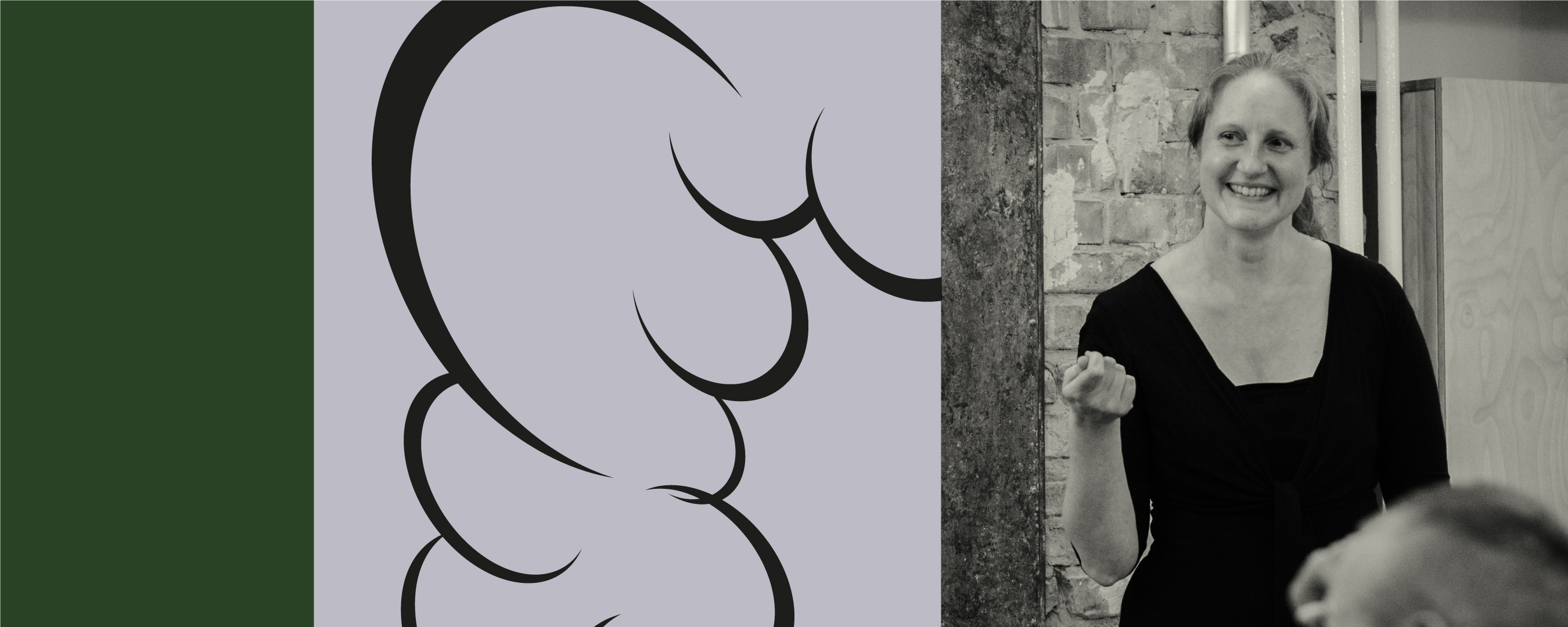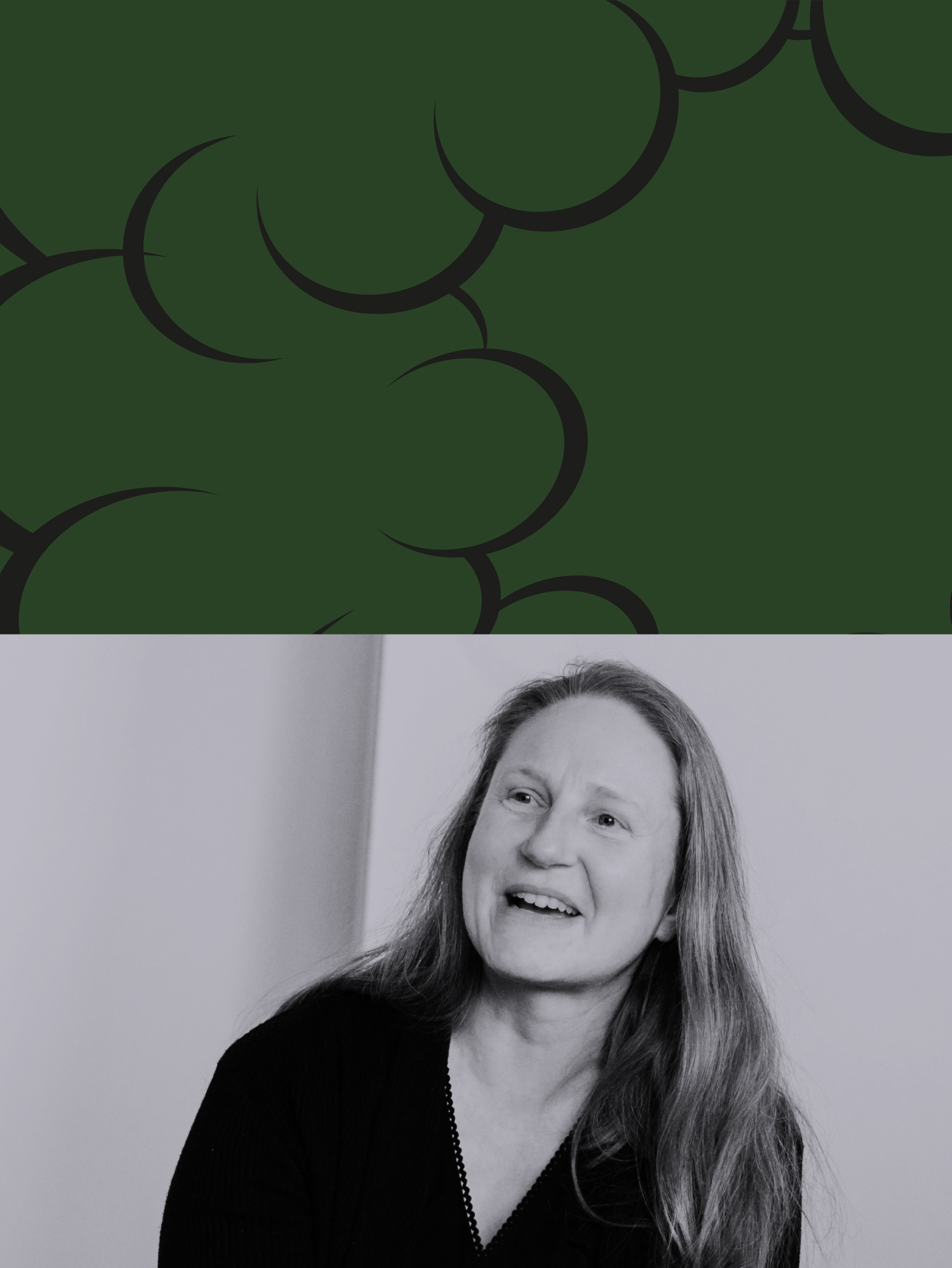The Molinari & Ko in Berlin's Bergmannkiez district is unparalleled. The mixture of café, restaurant and Italian delicatessen, paired with awood-panelled room and robust furniture, develops its very own charm. A place with character that a franchise system could never create. So it is not surprising that Karoline Rütter has chosen it as her second living room and that we meet there several times within a few days to talk about Artistic Intelligence she co-founded.
Steffen Vogt
Karoline Rütter
Why should the business world – the world of numbers, dates, facts – be more concerned with the world of the arts – the world of beauty, sensuality, experience?
The two worlds are perhaps not as contradictory as it is often portrayed: Entrepreneurship requires a lot of creative spirit. To be active as an entrepreneur or business leader has parallels with the artistic process. Conversely, many artists are also entrepreneurs, so they are quite familiar with the world of numbers. We are therefore convinced that artists in the broadest sense – visual artists, musicians, but also philosophers, kitchen chefs, humanists, etc. – and business executives are interesting discussion partners for each other. There are common themes and questions (e.g. self-control competence, creative handling of uncertainties in the process, making crises usable, to name just a few). But of course there are still enough differences in the respective worlds of experience and concrete questions that an exchange can provide fruitful impulses for both sides and broaden the horizon.
“It is extremely valuable to consult the perspective of an entirely different discipline.”
Karoline Rütter, Artistic Intelligence
Steffen Vogt
Karoline Rütter
With Artistic Intelligence you initiate and promote these encounters. What insight shave you gained so far?
We have good experiences with changes of perspectives, e.g. in order to re-question the initial question in entrepreneurial processes or to gain a healthy distance in a deadlocked moment and to recognize new solutions. For this it is extremely valuable to consult the perspective of a completely different discipline – e.g. philosophy. Or to acquire the artistic process for answering questions and, for example, to workon a specific entrepreneurial question for one day in the artist's studioinstead of a workshop room.
Steffen Vogt
Karoline Rütter
What kinds of questions are answered in your processes and how far does the work in a studio differ from the work in a workshop room?
Questions that arise in the course of processes in the fields of innovation, identity or brand positioning and organisational development deserve to be viewed more fundamentally in our perception after many years of experience as consultants. Sometimes, at second glance, the initial question conceals further, larger questions that should be answered first. Especially when these questions make it more fundamental, perhaps even existential, a studio offers more opportunities: It is a protected space that invites us to be more open and at the same time more courageous. Being able to use other forms of expression beyond language enables an approach to questions and answers with a much greater wealth of nuances, and also a valuable access to more intuitive knowledge.
Ideally, such a studio is available for the duration of the project, so that one can always retreat to this place, traces become visible and something new can emerge over time.

Steffen Vogt
Karoline Rütter
The access to this intuitive knowledge, is that the access to one's own gut feeling? Does this become rationally perceptible and perhaps even tangible through artistic action?
Each one of us carries a treasure of inner knowledge within us, which can be revealed more easily under good conditions. For example, in the case of longer decision-making processes, it can suddenly become clear which is the right path among several alternatives.When accompanying processes, it is therefore important that we do not remain with artistic exploration and experience, but with tangible insights into the question at hand. This requires a sensitive moderation and support in translating the artistic expression back into corporate language. We have been active as consultants for many years, but feel also at home in the world of art, and have recognised that being ‘bilingual’ is a valuable strength.
Steffen Vogt
Karoline Rütter
You mentioned at the beginning that artists are inspiring conversation partners for executives. Is it only about discussions? Or are there other points of contact between the disciplines in the processes you moderate? And if so, what do they look like in practice?
In our experience, transdisciplinary conversations are very valuable in order to be able to take different perspectives on an issue. In addition, our artist colleagues also take on other roles. Depending on the question, for example, the moderation of workshops in the studio. Or that of a researcher for exploring entrepreneurial issues with artistic means. In the future, it is also conceivable for us to arrange coaching tandems for mutual consultation across disciplinary boundaries. Our impression is that there will be more and more situations in which artists prove to be relevant sparring partners in order to make progress through productive changes in perspective in processes.
Ideally, such a studio is available for the duration of the project, so that one can always retreat to this place, traces become visible and something new can emerge over time.
Steffen Vogt
Karoline Rütter
On which observations is this impression based? Why will this become even more relevant in the future?
Entrepreneurial issues are becoming more and more complex and need to be readjusted or reformulated more and more frequently. And answers are less and less obvious. This inevitably pushes specialist consultants and experts to their limits. When well-tried strategies and solutions suddenly no longer work because the fundamental structures are completely different and constantly evolving unpredictably, the processural knowledge of artists or productive changes of perspective used by philosophers prove to be reliable competencies. Because unpredictability, contradictions and questions that cannot be answered unequivocally are for these disciplines rather interesting starting points for a knowledge-promoting debate than obstacles.
“It is impressive how quickly, relentlessly and thus constructively truths from everyday corporate life can be made visible with the help of artistic means.”
Karoline Rütter, Artistic Intelligence
Steffen Vogt
Karoline Rütter
May you share more concrete insights from a practical example?
A division of a large financial institution has just approached us with the question of how this division can best position itself within the corporation in the future. It was a wonderful experience to see how quickly, relentlessly and thus constructively truths from everyday corporate life can be made visible with the help of artistic means.
To give one concrete example: The workshop participants were invited to illustrate by artistic means the extent to which the self-image and external image of the sector within the bank diverge. The drawings were then swapped with the person sitting next to them and – without talking about it – painted on by the neighbour with the aim of depicting the ideal situation. In the subsequent reflection it became clear that it would not have been possible to name the really essential aspects so quickly and clearly through a purely verbal discussion. The artistic work on concrete questions offers freedom to illuminate the topic more thoroughly, including supposed taboos and "holy cows". This makes efficiency possible. And it is a pleasure too.

Steffen Vogt
Karoline Rütter
Similar to our format, the
Creative Leadership Salon, Artistic Intelligence curates salons in an entrepreneurial context. From your point of view, what is the special quality of such discussion rounds?
Salon evenings on entrepreneurial issues offer the opportunity to create encounters and a trusting exchange between interesting and interested people from a wide range of disciplines. The intimacy of a salon leads to great openness and a depth of conversation that is not often found at business events. It is important to us that our salon guests not only experience a special evening, which they remember with pleasure, but can also take along concrete impulses for their entrepreneurial actions.
Steffen Vogt
Karoline Rütter
And you also develop these formats on request collaboratively or on behalf of partners?
Yes, in cooperation with THEgarden Berlin, for example, in 2019 we initiated a series of salons on the subject of ‘purpose’ and for the opening we won three initiators from the disciplines of economic philosophy, human rights and ethical entrepreneurship, who gave depth to the discussion of this popular topic: Are there pointless companies? Do human rights also apply in business? As a result, one of the guests – CFO at a major start-up in Berlin – commissioned the human rights activist to examine his business processes. As curators of the evening, we feel once again confirmed that there is a great power in the salon format.
Strategy, Innovation, Problem-Solving, Creative Leadership

